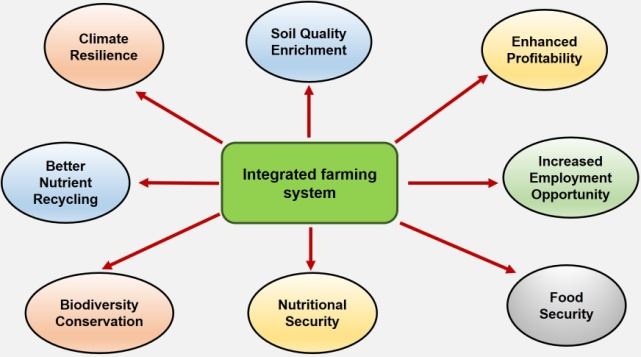
Agro- Based Business
Agro-based businesses involve utilizing agricultural resources to produce goods such as food, textiles, or materials. They rely on crops, livestock, or natural resources for manufacturing and trade..
Agro-Industry Services
Guidance on various aspects of agricultural businesses.
IFS Model
The IFS model is an innovative model that provides a new dimension to agriculture by providing it with sustainability. Integrated agriculture and its management are included under this IFS model. This method is very old but it was canceled in the past under the Green Revolution when there was only a need to produce more and more grains but after that it was seen that the quantity of grains increased but that Wheat was healthy and nutritious in proportion to quantity disappeared. The farmer's income also did not increase much and no special progress was made in this regard and it is in such a situation that this model has been conceptualized. The IFS model is a refined and improved model in which not only a means of increasing the income of the farmer has been created but also the work has been done to enhance the life and vital energy of the farmer by putting his skills into more practical implementation. When a farmer's family gets involved with integrated farming of various dimensions, he gets a new vision and as a result of this vision, he is able to create a vision of his own. Now the time of the farmer family is not spent in laziness or unemployment but in the moment of farm produce and thus this is a revolutionary change in itself. In this IFS model of integrated farming, the farmer comes to know how to market the different types of produce on his own and after a period of time, he also comes to know that he has now come to know the nuances of marketing. SAmSA has made a research study that there are 80 % are marginal and small farmers. To fulfill the basic needs of house hold including food (cereal, pulses, oilseeds, milk, fruit, honey, meat, etc.), feed, fodder, fiber, etc. warrant an attention about Integrated Farming System (IFS). Undoubtedly, majority of the farmers are doing farming since long back but their main focus was individual components but not in a integrated manner. At the ICAR and State Agricultural Universities level, lot of efforts have been made aiming at increasing the productivity of different components of farming system like crop, dairy, livestock, poultry, piggery, goat keeping, duckery, apiculture, sericulture, horticulture, mushroom cultivation etc. individually but lacking in their integration by following farming system approach. The integration is made in such a way that product of one component should be the input for other enterprises with high degree of complimentary effects on each other. The fodder fed to the cattle produces milk. The dung, urine and litter produce farmyard manure and energy used for crops and fish pond. The siltation of fish pond is utilized as manure to crops. The farmyard manure can substitute about 25% of recommended N P and K for crops, besides improving the physical and biological properties of soil. Integrated nutrient management can enhance the productivity of cereals by 0.5 to 1.0 t/ha. Processing of different products enhances the value addition to the extent of 25 to 50% besides generating 50-75-man days/ family/ year of employment. The fish pond embankment comprising 20-30% can be used for growing cucurbits and fruit trees which provide effective soil cover to checks the soil erosion and also make the system economically viable..